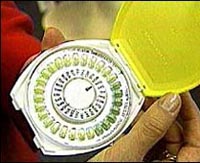Less effective birth-control pills could still be useful, health advisers say
New birth-control pills that are less effective than the original contraceptives from the 1960s still could win U.S. government approval if they promise other benefits, under a recommendation by health advisers.

Food and Drug Administration advisers refused this week to recommend limits on how often next-generation pills would have to fail for them to be denied federal approval.
"We don't want an arbitrary number to be ascribed," said Dr. Charles Lockwood of Yale University, acting chairman of FDA's reproductive health drugs advisory committee.
Instead, the panel of outside experts recommended the agency keep an open mind to approving less-effective pills that could offer other important benefits, such as reduced risk of blood clots and stroke.
Doing otherwise could limit the options available to women, the panel said.
Most of the roughly 12 million U.S. women who take the pill do so to prevent pregnancy. But others rely on hormonal contraceptives to curb acne or regulate their monthly periods. The latest, low-dose versions of the pill allow women to go 84 days between periods.
Throughout the 1960s, the earliest birth control pills to win FDA approval failed just once per 100 woman-years of use. That is, for every 100 women taking the pills for a year, there was fewer than one pregnancy on average among them.
Today, newer pills contain less estrogen and progestin. Those pills can reduce the risk of sometimes deadly side effects. But as the hormone content of the pills has dipped, failure rates have climbed.
Over the last decade, the FDA has approved some pills with failure rates that were twice the rate considered acceptable in the 1960s. Still, the pills remain highly effective, the FDA says.
The FDA acknowledged its own staff is split over whether to establish an acceptable failure rate for pills and, if so, what that rate should be. The FDA isn't required to follow the recommendation that it not set such a limit, but it usually does follow the judgment of its advisory committees.
Several panelists, during two days of meetings this week, suggested that any birth-control pill that isn't highly effective or offers some other benefit simply wouldn't sell, making the issue moot.
"If a new product isn't as good as what's out there, clinicians aren't going to prescribe it unless there's something there," said Lorraine Tulman, of the University of Pennsylvania's School of Nursing and the panel's consumer representative.
Panelist Dr. Paul Blumenthal, of Stanford University, even suggested the FDA establish different classes of pills, depending on their effectiveness in preventing pregnancy.
The FDA is considering future guidelines that drug makers could follow in seeking approval for new hormonal contraceptives, reports AP.
The FDA is looking at how well studies done prior to the approval of those products reflected their "real-world" use. Typically, that use is less consistent and reliable than it is in clinical studies.
In public testimony, experts said pill studies should include more older and overweight women to reflect the makeup of the U.S. population.
Subscribe to Pravda.Ru Telegram channel, Facebook, RSS!


